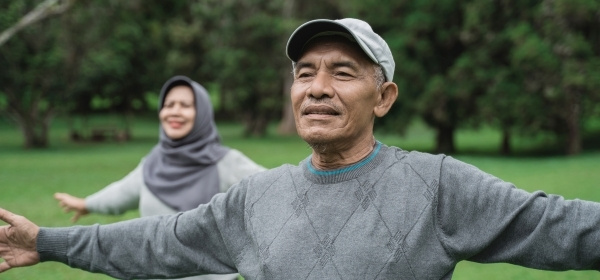Fitness: The Basics You Need to Know
If you’ve meant to get started on some form of physical activity, here's how you can get started.

Regular exercise can help overcome disability and improve the body’s functional abilities.
There’s no doubt that fitness should be an integral part of your day. Fitness is a health condition that allows individuals to perform daily activities with energy, participate in various physical activities, and reduce the risk of health problems. Components of fitness include: - Strength – the ability to cope with stress. - Stamina – maintaining a constant ability. - Flexibility – the ability to move and bend smoothly. - Coordination – the ability to combine various movements and balance. Acquiring and maintaining fitness requires a constant effort through consistent physical activities like exercise. In addition, regular exercise can help overcome disability and improve the body’s functional abilities. These guidelines can protect you from exercise injuries: - Consult a doctor before starting any fitness programme. - Start exercising slowly and increase gradually over a few weeks as you get fitter. - Begin your routine by alternating between 2-3 minutes of exercise and 2-3 minutes of rest for 15 minutes. - Add 2-3 minutes to your routine every week until it spans 30 minutes. - Start with a warm-up activity to avoid aches and pains after exercise. - Cool down with light activities such as walking or stretching to prevent dizziness and pain. - Slow down your workout if you have difficulty breathing while exercising. - Stop if you experience discomfort, hurt or dizziness. - Wear appropriate and comfortable attire. - Wear padded and comfortable shoes and socks to prevent foot injuries. - The best time to exercise is before 9.30 am or after 6 pm. - Drink sufficient amounts of water before, during and after exercise to replace the fluid loss to sweat. - Practice breathing exercises between workouts. - If you have diabetes, bring along something sweet to eat if you feel dizzy to prevent hypoglycemia. - If you have high blood pressure, stop exercising if you feel dizzy, get chest pains or have difficulty breathing. - If you’re obese, do not exercise aggressively and minimise high-impact movements to avoid muscle injury. - Choose a flat surface in a temperature- and humidity-controlled area.

Wear padded and comfortable shoes and socks to prevent foot injuries.
The benefits of exercise: - Improves your physical fitness. - Improves balance, coordination and walking style. - Increases your energy for daily tasks. - Improves your self-esteem and reduces anxiety. - Accelerates recovery from illness and mental stress. - Controls blood pressure and strengthens your heart. - Improves the ability to control blood glucose levels. - Slows down osteoporosis. Guidelines for choosing an exercise programme: - Exercise according to your physical ability. - Do enough to benefit. The activity should also be fun. - Do not participate in any activity beyond your means or excessively. - Consult a doctor before starting any training. If you have health problems, adjust the exercise to the level of activity. Easy tips to stay active at home: - Stretch your body for a few minutes before and after bed. - Stand while answering a phone call. - Perform stretches while watching TV. - If you can, use manual rather than electrical tools when gardening. - Walk more to increase your daily steps. - Use the stairs as often as you can instead of lifts. Source: MyHEALTH Portal, Health Ministry Malaysia.
